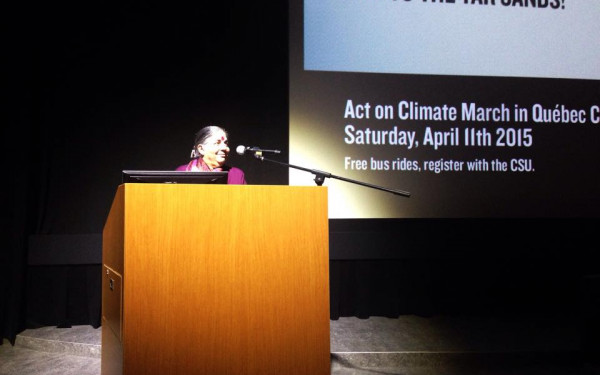Students “literally shaking with rage” over university’s negligence at CSU’s emergency consultation
Members discussed urgent problems from academic issues, accessibility issues, and handling of the return-to-campus plan
Both the Concordia Student Union executive team and students expressed their grievances against the university’s administration at an emergency consultation on Nov. 22, hosted to address unresolved campus issues. Students felt enraged, neglected, ignored, trivialized, and overlooked on several pressing matters.
These issues included the absence of pass/fail grading, recorded lectures and a lack of accessibility both on and off campus.
Pass/Fail
On Nov. 19, the CSU received an overwhelming positive response in the By-Elections for the reinstatement of Pass/Fail at Concordia this semester.
See also: More than 20 per cent voter turnout highlights return to political normalcy for the CSU
Nearly 94 per cent of students voted in favour of the grading option, however, according to Academic & Advocacy Coordinator Hannah Jamet-Lange, the university removed pass/fail for the current semester without any student consultation.
Jamet-Lange said the university’s reason was said to be a difficulty in calculating the annual GPA with pass/fail. Jamet-Lange was told that this is used in identifying students that are in conditional and/or failed standing and then providing resources to help them. CSU representatives recommended finding alternative methods to helping such students besides discontinuing Pass/Fail which might academically hinder these students further.
"It's been very frustrating to hear that we, as students, don't know what is best for students," Jamet-Lange added.
A motion to vote on reinstating pass/fail was written to the senate but Jamet-Lange said it was cut from the senate meeting’s agenda that was scheduled for Nov. 12.
"We weren't even given the space at senate to discuss it, and instead, a committee is being put together to discuss the benefits and negatives of pass/fail."
Read more: Put students on the agenda
General Coordinator Eduardo Malorni complained of the lack of student representation in the university’s democracy.
"We are in the minority despite being the majority of the school's population,” Malorni said.
“If there are any senior administrators listening, I would just like you to know that that is an absolute copout of all of your responsibility. I am absolutely disgusted that that is what you think accessibility is.” — Sophie
Accessibility Issues
Jamet-Lange and Malorni complained of student neglect, when it came to matters of service and academic accessibility.
The elections also resulted in a 96 per cent voting support of having recorded lectures and livestreaming for students who cannot attend in person classes due to proximity, health, and safety reasons.
"The university does not think that it's necessary or possible to implement [recorded lectures] across the board, instead the university is adding a new blended mode of learning, one that will include asynchronous and synchronous learning,” said Jamet-Lange.
According to Concordia’s Centre for Teaching and Learning, blended learning would be implemented in classrooms where “course work typically takes place on Moodle, offline, or as part of an experiential learning activity within a designated time frame.”
The CSU has voiced that this would be extremely confusing for students, cause more issues for students, and would not address the actual problem that students have with safety on campus.
Geography student Nicolas Chevalier felt inconsistencies and double standards in Concordia’s hybrid return-to-campus approach this semester.
“The overall message from Concordia is that ‘we’re back in person for your classes, get them done. Any sort of service for you, tough crap, you’re going to have to do it online or not whatsoever,’” they stated.
"Even if just a few students are affected by this, that is an accessibility issue, that is an issue that needs to be addressed," Jamet-Lange added.
Malorni said it is not just in the sphere of COVID where student voices are being ignored. He noted the introduction of hospitality fees for renting out spaces on campus which used to be free prior to COVID. These fees were said to be put in place in September without any consultation, notification or warning to students or the CSU.
Students asserted that Concordia’s health services are so inadequate, inaccessible, and unavailable to the point where voicemails cannot be left due to completely full voicemail boxes on phone lines.
Sophie, an undergraduate student in the geography department said,“I have called seven times in the past week and have never gotten through to anyone.”
"I have been disgusted with this administration for a long time but literally shaking with rage is how I would describe my current state of mind," said Sophie. "If there are any senior administrators listening, I would just like you to know that that is an absolute copout of all of your responsibility. I am absolutely disgusted that that is what you think accessibility is."
“A common theme we’ve seen throughout the length of this pandemic is us paying for services that we’re not able to access,” said Julianna Smith, moderator of the consultation. “That’s not the way things should be.”
Moderator Nicole Leblanc mentioned this isn’t anything new, "This is not just about COVID, the COVID situation has really exacerbated a lot of the issues that were already present at this university."

_900_643_90.jpg)
_600_832_s.png)


_600_375_90_s_c1.jpg)
_600_375_90_s_c1.jpg)
1_600_375_90_s_c1.jpg)